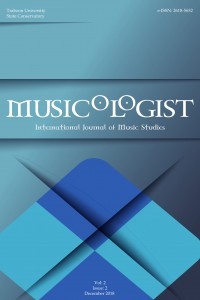Ancient Greek Rhythms in Tristan and Nietzsche
Ancient Greek Rhythms in Tristan and Nietzsche
It was Friedrich Nietzsche, appointed professor of classical philology in 1869 at the age of twenty-four and before he had completed his doctoral dissertation, who first postulated on the basis of rigorous textual studies that eminent classical philologists active in Central Europe in the nineteenth century had gone seriously off-track. Nietzsche’s teaching and research notes on ancient Greek rhythm, the four notebooks he composed during his short-lived professorship at Basel University, were not published until 1993. In them Nietzsche alluded to Wagner’s use of Greek rhythm in Tristan, though he did not give a straightforward account of how he understood it. This paper takes a cue from Nietzsche’s most extended analysis of a Tristan excerpt (act III scene 2) buried therein, which proves catalytic in leading to an analysis through which I argue how Wagner made covert use of ancient Greek rhythm in Tristan under the constraint of the modern notation and the metrical system.
Keywords:
Greek rhythm, Wagner, Tristan Nietzsche,
___
- Bornmann, Fritz. (1989). ‘Nietzsches metrische Studien’ [Nietzsche's Metric Studies] Nietzsche-Studien. 18: 472-489.
- Corbier, Christophe. (2009). ‘Alogia et eurhythmie chez Nietzsche [Alogia and Eurhythmia in Nietzsche],’ Nietzsche-Studien: Internationales Jahrbuch für die Nietzsche-Forschung. 38: 1-38.
- Fry, Katherine. (2013). ‘Nietzsche, Tristan und Isolde, and the Analysis of Wagnerian Rhythm’, The Opera Quarterly. 29 (3-4): 253-276.
- Gevaert, François-Auguste. (1881). Histoire et théorie de la musique de l’antiquité, livre III (‘Rhythmique et métrique’) [History and Theory of Music from the Antiquity, book III (‘Rhythm and Meter’)]. Gand: Annoot-Braeckman.
- Maas, Paul. (1962). Greek Metre. (Hugh Lloyd-Jones Trans.) Oxford: Oxford University Press. [Original work published 1923]
- Messiaen, Olivier. (1956). The Technique of My Musical Language. (Satterfield, John, Trans.) Paris: Leduc.
- Messiaen, Olivier. (1994).Traité de rythme, de couleur et d’ornithologie, tome I [Treatise of Rhythm, Color and Ornithology] Vol. 1. Paris: Leduc.
- Nietzsche, Friedrich. (1969). Selected Letters of Friedrich Nietzsche. (Middleton, Christopher, Trans.) Chicago: Chicago University Press.
- Nietzsche, Friedrich. (1993). ‘Griechische Rhythmik, Aufzeichnungen zur Rhythmik und Metrik, Zur Theorie de Quantitirenden Rhythmik, Rhythmische Untersuchungen [Greek Rhythm, Notes on Meter and Rhythm, On Theory of Quantitative Rhythm, Rhythmic Studies]’ Werke: Kritische Gesamtausgabe, Abt. II Bd. 3, Ed. Fritz Bornmann and Maria Carpitella. Berlin: Walter de Gruyter.
- Nietzsche, Friedrich. (1997). Untimely Meditations. (Hollingdale, Reginald J. Trans.) Cambridge: Cambridge University Press.
- Porter, James. (2000). Nietzsche and the Philology of the Future. Stanford: Stanford University Press.
- Wagner, Richard. (1906). Tristan and Isolda [vocal score by Richard Kleinmichel]. New York: G. Schirmer.
- West, Martin L. (1982). Greek Metre. Oxford: Clarendon Press.
- West, Martin L. (1992). Ancient Greek Music. Oxford: Clarendon Press.
- Winnington-Ingram, Reginald Pepys; Mathiesen, Thomas J. (2001, January 1). ‘Westphal, Rudolf,’ Grove Music Online. Retrieved from http://www.oxfordmusiconline.com/subscriber/article/grove/music/30179?q=westphal&search=quick&pos=1&_start=1#firsthit
- Yayın Aralığı: Yılda 2 Sayı
- Başlangıç: 2017
- Yayıncı: Trabzon Üniversitesi
